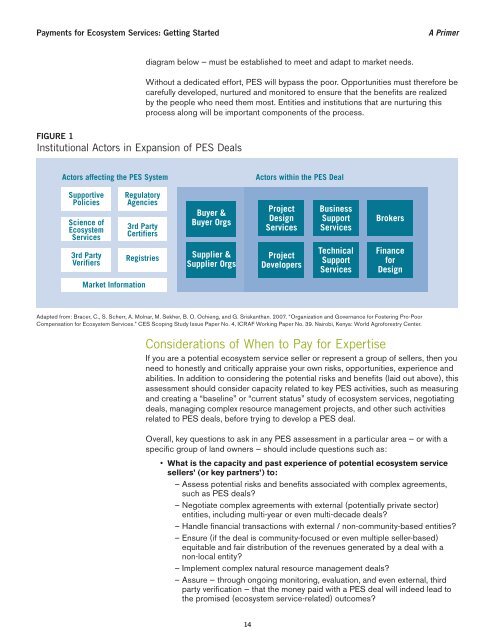Payments for Ecosystem Services: Getting Started. A Primer - UNEP
Payments for Ecosystem Services: Getting Started. A Primer - UNEP
Payments for Ecosystem Services: Getting Started. A Primer - UNEP
Create successful ePaper yourself
Turn your PDF publications into a flip-book with our unique Google optimized e-Paper software.
<strong>Payments</strong> <strong>for</strong> <strong>Ecosystem</strong> <strong>Services</strong>: <strong>Getting</strong> <strong>Started</strong><br />
A <strong>Primer</strong><br />
diagram below — must be established to meet and adapt to market needs.<br />
Without a dedicated ef<strong>for</strong>t, PES will bypass the poor. Opportunities must there<strong>for</strong>e be<br />
carefully developed, nurtured and monitored to ensure that the benefi ts are realized<br />
by the people who need them most. Entities and institutions that are nurturing this<br />
process along will be important components of the process.<br />
FIGURE 1<br />
Institutional Actors in Expansion of PES Deals<br />
Adapted from: Bracer, C., S. Scherr, A. Molnar, M. Sekher, B. O. Ochieng, and G. Sriskanthan. 2007. “Organization and Governance <strong>for</strong> Fostering Pro-Poor<br />
Compensation <strong>for</strong> <strong>Ecosystem</strong> <strong>Services</strong>.” CES Scoping Study Issue Paper No. 4, ICRAF Working Paper No. 39. Nairobi, Kenya: World Agro<strong>for</strong>estry Center.<br />
Considerations of When to Pay <strong>for</strong> Expertise<br />
If you are a potential ecosystem service seller or represent a group of sellers, then you<br />
need to honestly and critically appraise your own risks, opportunities, experience and<br />
abilities. In addition to considering the potential risks and benefi ts (laid out above), this<br />
assessment should consider capacity related to key PES activities, such as measuring<br />
and creating a “baseline” or “current status” study of ecosystem services, negotiating<br />
deals, managing complex resource management projects, and other such activities<br />
related to PES deals, be<strong>for</strong>e trying to develop a PES deal.<br />
Overall, key questions to ask in any PES assessment in a particular area — or with a<br />
specifi c group of land owners — should include questions such as:<br />
• What is the capacity and past experience of potential ecosystem service<br />
sellers’ (or key partners’) to:<br />
– Assess potential risks and benefi ts associated with complex agreements,<br />
such as PES deals?<br />
– Negotiate complex agreements with external (potentially private sector)<br />
entities, including multi-year or even multi-decade deals?<br />
– Handle fi nancial transactions with external / non-community-based entities?<br />
– Ensure (if the deal is community-focused or even multiple seller-based)<br />
equitable and fair distribution of the revenues generated by a deal with a<br />
non-local entity?<br />
– Implement complex natural resource management deals?<br />
– Assure — through ongoing monitoring, evaluation, and even external, third<br />
party verifi cation — that the money paid with a PES deal will indeed lead to<br />
the promised (ecosystem service-related) outcomes?<br />
14
















